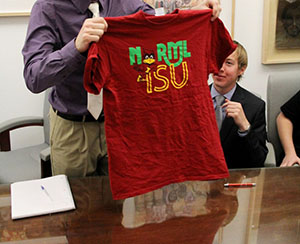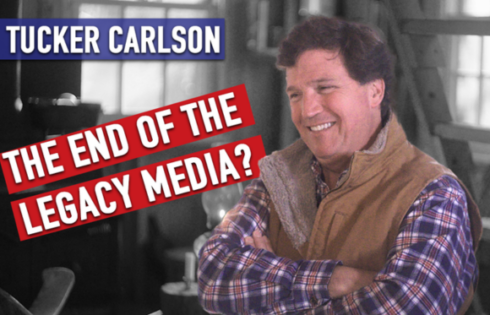
Sometimes the most revealing thing about a lawsuit is the collection of interest groups filing briefs as amici (friends of the court) in support of one party.
You may be surprised to learn that a suit brought by a pro-marijuana student group at Iowa State University drew some unexpected amici in favor of the potheads:
Student Press Law Center; Ratio Christi; Students for Life of America; Christian Legal Society; Young America’s Foundation; Young Americans for Liberty
Why? Because they all understood the threat to their interests – a free press, religious freedom, pro-life activism, conservatism and libertarianism – if a public university is allowed to single out pro-pot student speech as subject to unique hurdles.
Promiscuous trademark practices … except for one
The 8th U.S. Circuit Court of Appeals just ruled in favor of all their interests by affirming a lower-court ruling in favor of ISU’s chapter of the National Organization for the Reform of Marijuana Laws (NORML).
As we reported more than two years ago when this litigation started, the administration had told the potheads they couldn’t make club t-shirts with both a marijuana leaf and the school’s name or logo because … well, it’s our trademark and you can’t have it because people might think we all smoke the doobie.
MORE: Court tells ISU to stop suppressing pro-weed activists
The problem, as a federal judge ruled a year ago, is that ISU was a real slut when it came to letting every other student group use its trademark:
The Trademark Office’s history of design approvals further demonstrates ISU does not license its trademarks to student groups to announce its political views, because the office has approved designs for an inchoate set of interest groups that are in one instance pro-life, then pro-BDSM, then pro-LGBTA, pro-Democrat, and pro-Republican.
It’s the first lawsuit to reach an appeals-court ruling in the Foundation for Individual Rights in Education’s Stand Up for Speech litigation project, which kicked off in 2014 by featuring the ISU student plaintiffs, according to a FIRE spokesperson.
In its ruling upholding the district judge, the 8th Circuit laid out the political panic that was set off inside ISU when the local newspaper did a feature on the pro-pot students and their newly approved t-shirt.
Administrators and PR people made clear that they wanted to review trademark application procedures only because the approved shirts had been covered in the media, which led to scrutiny from the Republican governor and Republican legislative staffer.
Same as making gay-rights group jump through hoops
The three-judge panel thoroughly rejected ISU’s arguments: that the ex-student plaintiffs didn’t have standing because it was their club’s speech that was allegedly stifled (not their own); that ISU made viewpoint-neutral decisions; and that it wasn’t even the students’ speech to begin with, but rather the government’s (since ISU is a public university).
 The panel said the “actions and statements” by ISU officials show that they imposed “unique scrutiny” on NORML ISU that other student groups in good standing never had to endure, including prior review of their designs by campus officials before they were submitted to the trademark office.
The panel said the “actions and statements” by ISU officials show that they imposed “unique scrutiny” on NORML ISU that other student groups in good standing never had to endure, including prior review of their designs by campus officials before they were submitted to the trademark office.
MORE: Judge says students can sue president for t-shirt censorship
President Steven Leath’s testimony also doomed the school’s case because it made clear ISU was acting in response to political pressure, and other officials’ comments to NORML ISU suggest that they didn’t like how it advocated for marijuana legalization (through “attention grabbing sensationalism”).
ISU’s behavior was compared to the University of Alabama’s when it made a gay-rights student group jump through hoops to get funding in response to political pressure. The 8th Circuit ruled the same in that 1988 case.
Not the same as a license plate, either
The appellate judges also called BS on ISU’s “government speech” argument, noting that the university had created a “limited public forum” for the use of its trademarks.
Even if it hadn’t done that, the 8th Circuit said the case was very different from another on which ISU had heavily relied, the Supreme Court’s 2015 ruling in Walker, which said states have the right to control the messages on specialty license plates.
The Supreme Court set a three-part test for determining when the government can claim speech as its own:
First, it determined whether the government has long used the particular medium at issue to speak. … Second, it analyzed whether the medium is “often closely identified in the public mind with the” state. … Third, it determined whether the state “maintains direct control over the messages conveyed” through the medium.
MORE: How license plates are like campus speech
Obviously, ISU’s case falls apart when compared to Walker, since it does not license its trademarks “to speak to the public.”
You can see why so many groups wanted the 8th Circuit to know this is not just an issue for potheads.
Religious and conservative speech often faces official discrimination under the fig (instead of pot) leaf of fighting discrimination, and sometimes it legally sticks, as in California State University’s blatant bias against Christian student groups that require their leaders to be Christians.
Thankfully with this high-profile win for FIRE, administrators have one fewer sanctioned way to discriminate against students whose speech they dislike.
MORE: Christian groups allowed back at Cal State after junking faith rule
Like The College Fix on Facebook / Follow us on Twitter







Please join the conversation about our stories on Facebook, Twitter, Instagram, Reddit, MeWe, Rumble, Gab, Minds and Gettr.